Is snorkeling on the Great Barrier Reef on the top of your bucket list? It’s an experience like no other, a marine adventure that people travel the whole world to experience, an unforgettable day during your time in Australia. In this post we talk about snorkeling on the Great Barrier Reef, what it’s like, what are the dangers, is it safe, where can you snorkel, sharks on the GBR, taking kids snorkeling on the reef, and more.
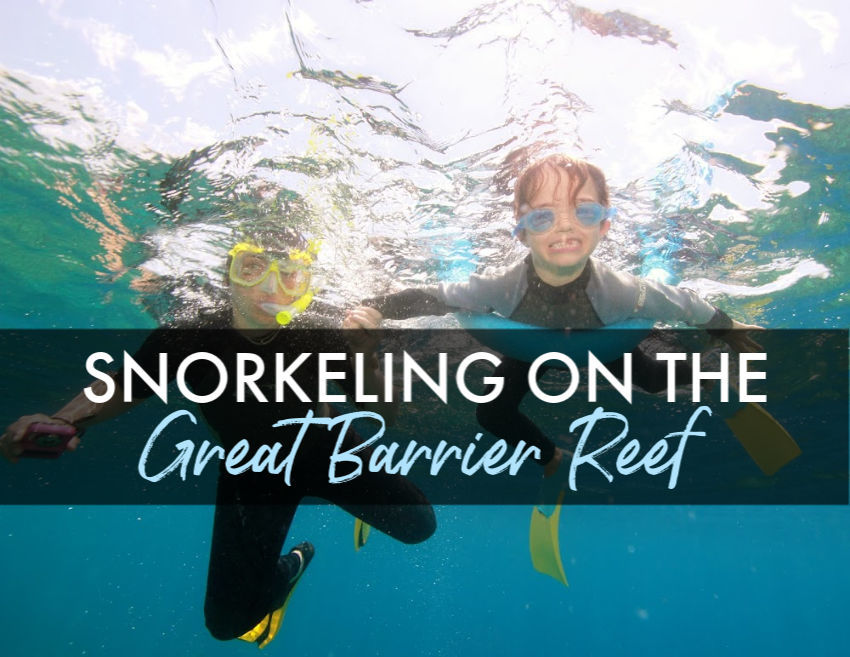
We’ve lived in Far North Queensland on and off for over a decade. We are divers (Padi Advanced) and snorkelers. Our kids first went out to the reef at around 2 and 4 years old, that’s me and Boo above, he was 6. They, and we have snorkeled all over the world, but the GBR is home.
Great Barrier Reef Snorkeling
There are so many questions and so many variables related to snorkeling on the Great Barrier Reef. The reef itself is vast, 2,300 km long (that’s 1,430 miles) and is the largest coral reef system in the world. There are many places along its length along the northern east coast of Australia to take a snorkel trip. We are in the southern hemisphere, so the further north you go, the warmer it will be. Yes, there have been coral bleaching events recently but the reef is far from dead and is still worth visiting. How quickly that will change, we don’t know, but we do our best to answer your questions below. My husband works on the reef, he’s out there on one of the snorkel boats several times a week, in the company of marine biologists. We are a trusted source of information.
Where To Snorkel on The Great Barrier Reef
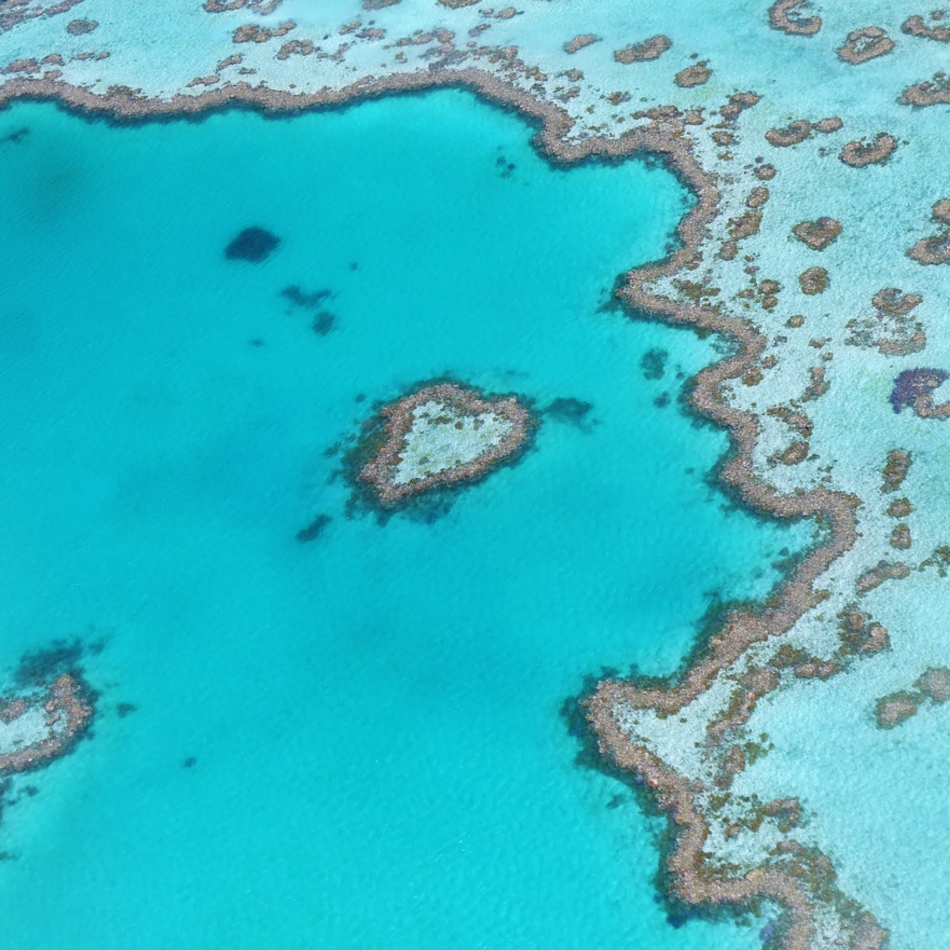
The Great Barrier Reef is huge, stretching almost halfway along the eastern coast of Australia. It’s 2,300 kilometres long, that’s 1,400 miles and comprises 2,900 individual reefs and 900 islands. As such, there are many places to snorkel. In Far North Queensland, our home, we have to take a lengthy boat journey to reach the reef. This, in part, is what makes it so expensive to visit. There are a few islands off Australia where you can snorkel off the beach. The table below gives you a few of the best places to snorkel on the GBR, heading roughly south.
| Daintree, Cape Tribulation | Reef Day Trips by Boat. Mackay and Undine reefs. |
| Port Douglas | Pontoon snorkelling and boat day trips. Low Isles trips also. Ribbon reefs, Saxon, Norman, Hastings, Agincourt |
| Cairns | Pontoon snorkelling, islands, boat trips, liveaboards, Green Island. Fitzroy Island |
| Palm Cove | None that we know of currently. |
| Mission Beach | Boat trips and Dunk Island |
| Bundaberg | Lady Elliott Island, Lady Musgrave Island |
| Townsville | Magnetic Island, Orpheus Island |
| Whitsundays | Hayman Island, Blue Pearl Bay, Underwater Art Installation. Boat or pontoon to Hardy Reef |
| Gladstone | Heron Island |
We haven’t done every trip to the Great Barrier Reef, but we’re doing our best to do as many trips as we can in order to review them. If you have a snorkel tour which you’d like us to share, please let us know, we’d love to feature it.
How to Snorkel
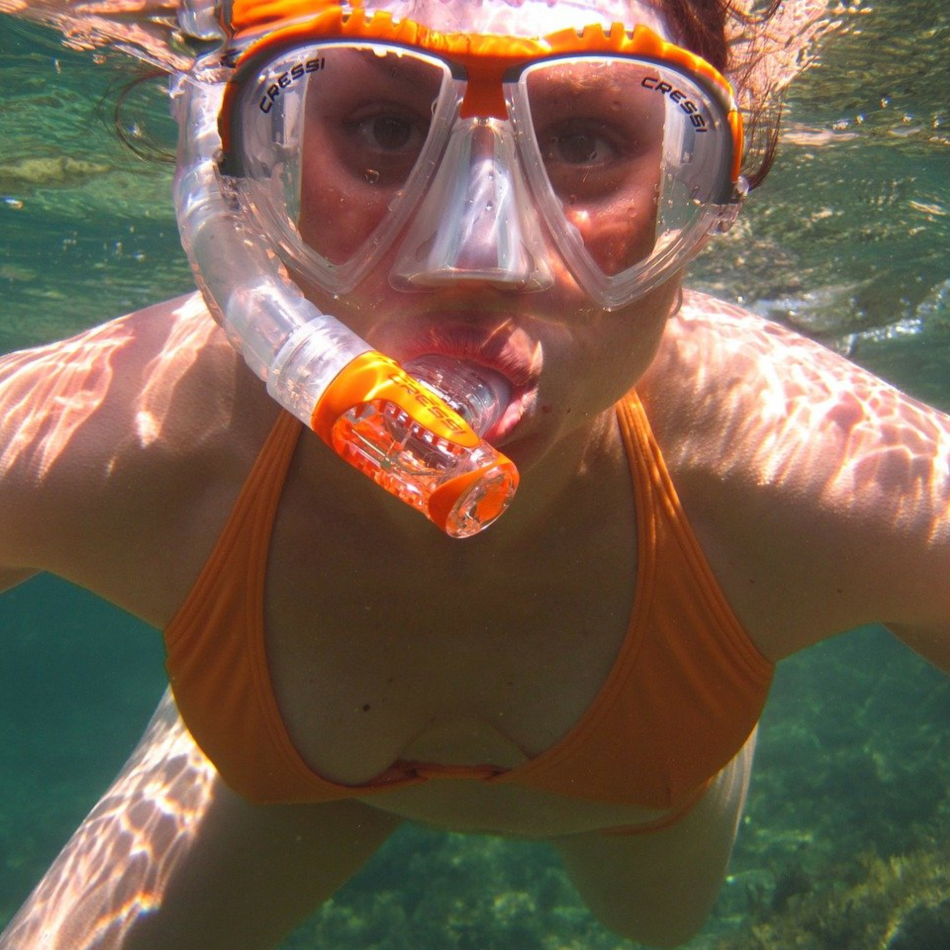
Just in case you didn’t know, snorkeling is basically swimming or floating in the water, looking down at fish and coral, while using a snorkel to breath. It’s not hard and you don’t need to be a great swimmer. My husband works on a snorkelling boat on the Great Barrier Reef and sees hundreds of snorkellers, many are beginners. Here are a few tips from a pro.
- Keep calm, go slowly, control your breathing, don’t panic.
- If you buy your own brand-new snorkel and mask, clean the protective film off the inside of your mask before first using it. We use toothpaste for this.
- Make sure your fins fit well. If they drop off, they can sink.
- Follow your crew’s instructions, stay where it’s safe and don’t get taken away by currents.
- Don’t try and climb up ladders to a boat in fins, they break and you’ll likely hurt yourself.
- Yes, you can use flotation devices, such as pool noodles and life jackets when snorkelling. Hold onto them, the wind will take them easily and pool noodles are terrible for marine plastic pollution.
- Be very aware of the sun. Your hairline, above your mask, is a common place to burn.
- Use reef-safe sun protection, like this, but cover as much of your body as possible with rashies (rash vests) or stinger suits. Take a look here.
- Make your lips like Angelina Jolie to get a good fit around the snorkel.
- Don’t breath in or out through your nose.
- Beards and moustaches can cause your mask to leak. Use Vaseline to create a seal. Thick beards normally aren’t a problem.
- Make sure you don’t get hair under your mask.
- Your mask should be quite loose, water pressure will hold it on. The tighter it is, the more likely it is to leak.
- Full face snorkel masks aren’t ideal for snorkelling on the reef. An old-fashioned (good quality) mask and snorkel set is probably better, but the full face masks are fun. Some kids snorkel sets are really just toys.
- If you’re in any danger of sea sickness, take medication, it will ruin your day.
How Expensive is a Snorkeling Trip to the Reef ?
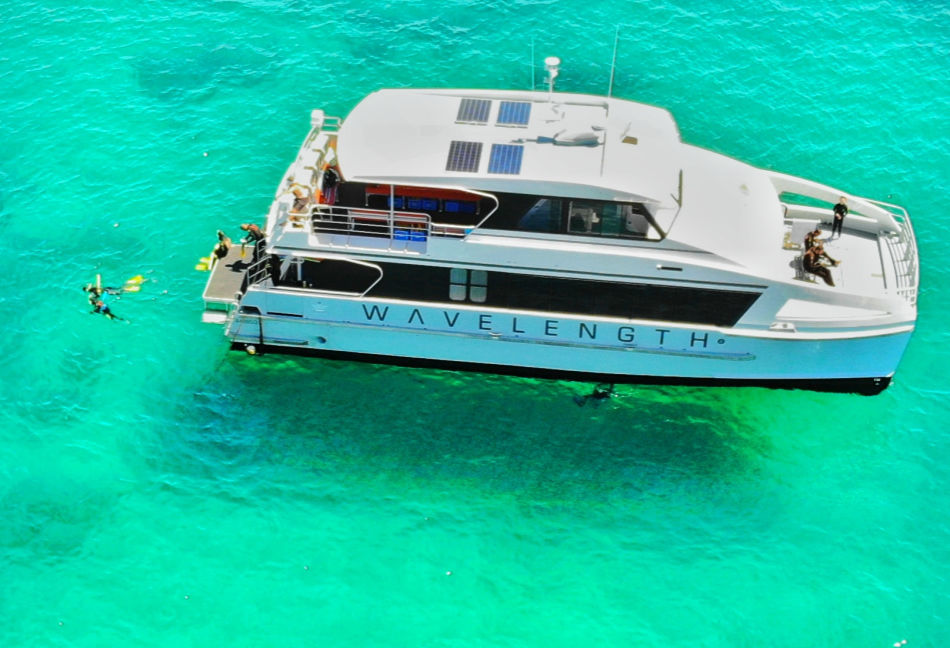
Snorkeling on the Great Barrier Reef is an amazing day out but it carries a hefty price tag, at least 7 hundred dollars Au for a family day trip, often a lot more. I’m working on a full cost break-down in this section. Per person snorkelling costs for the Great Barrier Reef are in the region of $200 Au plus per day. This will vary with season and location.
It’s worth it, it’s unlike any snorkeling experience I’ve had anywhere else in the world. You should go if you get the chance. Check our video below, we also talk about scuba diving, scuba certification and liveaboards on the reef. Click through for full posts on these topics. Check out our recent shark encounters in the video above!
Is Snorkeling on the Great Barrier Reef Scary?
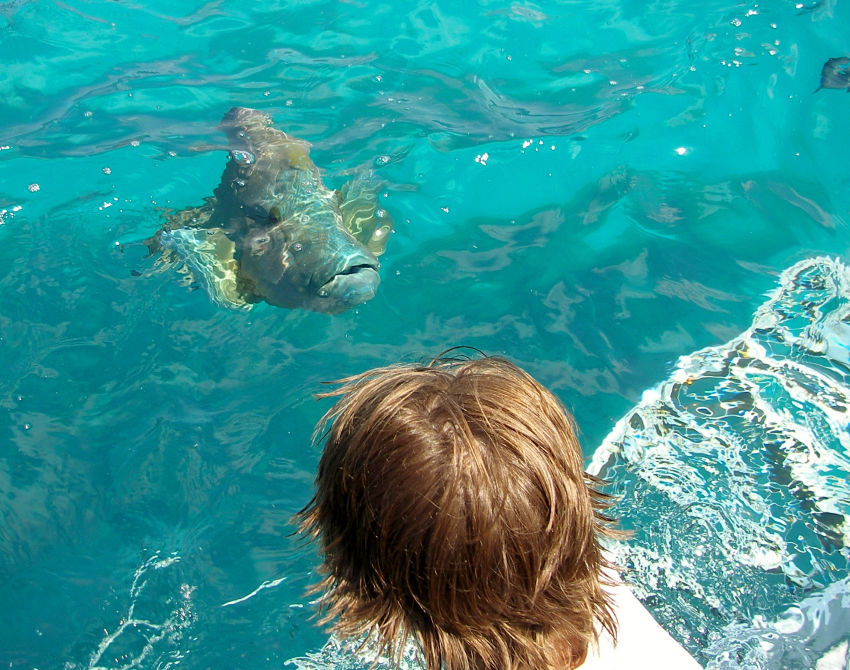
A lot of people are nervous or anxious about deep water, fish with teeth, getting left behind or many perceived dangers. I can relate because that was me, I was scared to death to go out there first time. Read on, it’s not so scary really!
The Great Barrier Reef is a long way away from the Queensland coast, certainly up here in Port Douglas and Cairns. It takes around an hour to an hour and a half on the boat to get there.
It’s not just paddling out from the shore like you would with fringing reefs, you are in open water and it’s deep away from the actual areas of coral.
Snorkeling the Great Barrier Reef involves jumping off the back of the boat or pontoon into deep water, it can be scary, the thought used to terrify me, but now I find my desire to see the fish is stronger than my fear of jumping in the water.
I just used to get on with it but nowadays, after a few years of practice and knowing there’s really nothing to worry about, I’m fine.
You usually find that there will be a bit of deep water to cross before you get to the actual coral, obviously boats can’t moor on the coral. You can see the bottom if the visibility is good and there should be lots of other people around. It’s not so bad, my 6 year old can do it.
Most reef boats are running after Coronavirus and through the pandemic crisis. My husband crews on one of them so we stay very current with all developments. New measures to protect us from infection are in operation, track and trace, no buffets, food is now individually packaged, and reduced capacity. You’ll see a less crowded reef. However, lack of tourists means that not all boats are running every day
Will I See Sharks on the Reef?
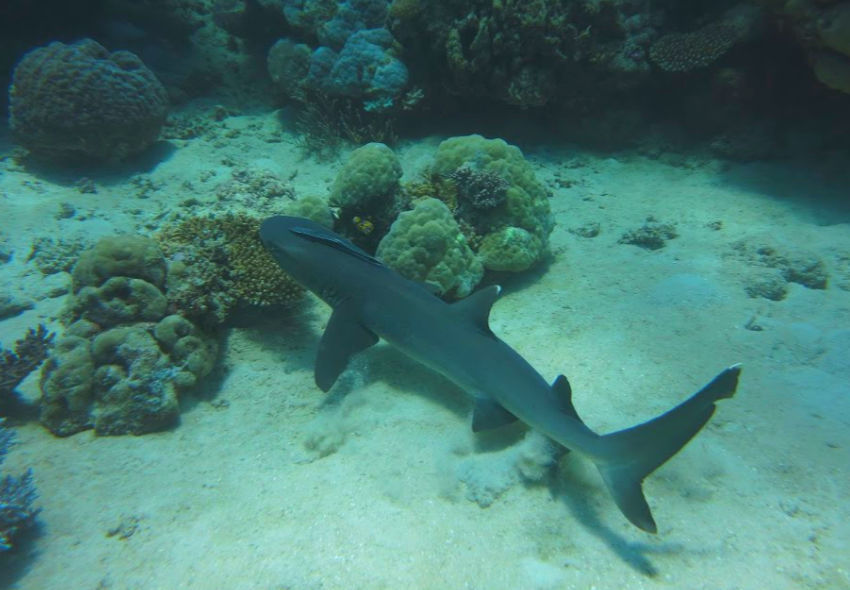
There are loads of sharks on the Great Barrier Reef but will you see them?
Only if you’re lucky.
Species of shark found on the Great Barrier Reef include white and black tip reef sharks, leopard sharks, wobbegongs, epaulette sharks and grey whalers. None of these are particularly dangerous unless you try to touch, feed or otherwise mistreat them.
Sharks don’t want to be around people and you’re most likely to get a glimpse of one disappearing rapidly.
On our most recent snorkel trip I saw 1 white tip in 3 hours and I was actively looking for them by swimming along the wall, away from people. The time before we saw 4 white tips throughout the day, again, we were looking for them, we like sharks. All were smaller than my son.
Staff on the boat told us they’d seen a leopard shark the day before, a rare event that was really exciting for them.
You are far more likely to see sharks scuba diving. You don’t often see them on top of the reef, in fact I’ve never seen one above the reef, only in the deeper water around the edge.
In theory, there are no Great White Sharks on the Great Barrier Reef. It’s too warm for them as they’re a cold water fish. There is a vague possibility of tiger sharks, oceanic whitetips, bronze whalers, or hammerheads wandering into the coral from deeper waters, but I don’t know anyone who’s ever seen one while they’ve been snorkeling on the GBR.
There have been rare sightings of whale sharks on reef trips, but it’s rare. Don’t get your hopes up.
You can go shark diving from northern Queensland and see the big sharks but it’s specialised and you need to head further out. More on this later, we’re trying to arrange a trip. Night dives are great for seeing the small reef sharks in predation mode, again, they pose very little threat to humans even at night.
Bull sharks tend to make their presence felt more in murky estuaries where yes, they have been a danger to people.
Spearfishing puts you at an increased risk of shark inflicted injury. But why would you want to kill our beautiful reef fish?
I’ve scuba dived with grey nurse sharks, lots of them, big ones. They totally ignored us, just remained almost motionless and looked menacing. Most sharks aren’t interested in you at all. This organised shark dive was down south at Bateman’s Bay in New South Wales. I’ve never seen a grey nurse shark on the reef.
Dangers of Snorkeling on the Reef
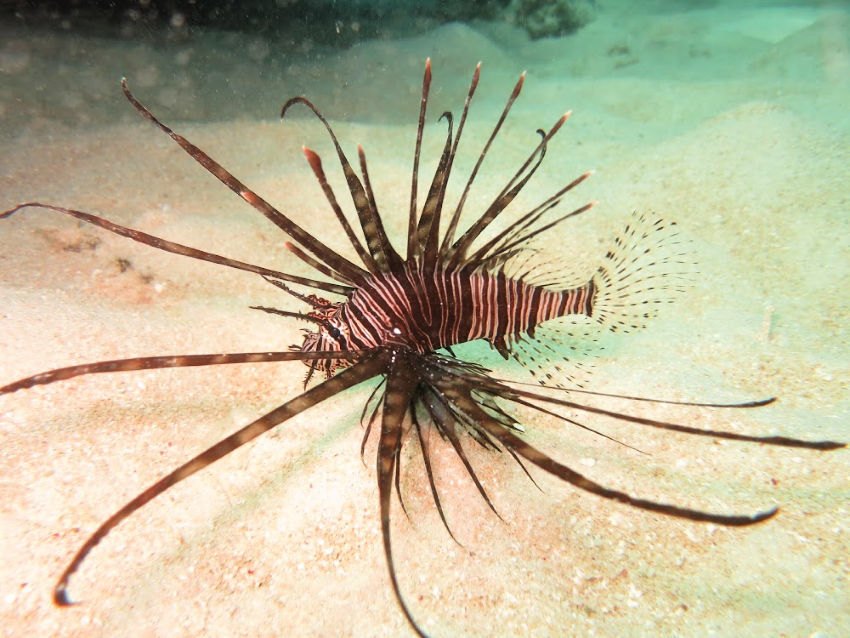
If you follow the rules you really shouldn’t be in any danger on the Great Barrier Reef. Yes, there are things out there that could hurt you. But there are anywhere.
You need to be aware of Stinger Season and follow regulations with regard to stinger suits. They are there for your protection.
The sun is possibly your biggest danger out there, it’s fierce.
You may see fish that can sting or puncture, some rays, maybe a lionfish, but they won’t chase after you to hurt you.
Follow instruction. The crew know what they are doing.
Don’t snorkel or dive beyond your limits.
Don’t swim too far. Most boats have somebody on watch, often the skipper, they keep an eye on everyone in the water. If you’re told to stay in a certain area, do it.
Crew count snorkellers time and time again. If somebody goes missing (unlikely) they will know.
Don’t be dumb, don’t touch anything or get too close to anything. Even an angry turtle could bite.
Sharks are not a danger (mostly), sharks are friends.
Crocodiles on The Great Barrier Reef
North Queensland has plenty of crocodiles. These are salt water crocodiles and yes, they have been seen out on the reef. Our electrician recently showed me video he shot of a very small crocodile while he was out there. He actually swam after it to get a better shot. It’s incredibly rare. Likewise crocodiles can put in an appearance on beaches.
Are There Jelly Fish on the Great Barrier Reef?
There are millions of tiny organisms in the water and some will make your skin tingle. But what of the dangerous jellyfish?
It’s always a possibility you’ll encounter one, but a fairly unlikely one. In Queensland we have Stinger Season from around November to May, it’s when the water is warm enough for the deadly Iirukadje and box jellyfish.
There are thousands of people out on the reef every week, it’s fairly rare to hear of a major sting.
Your chances of getting stung on the reef are lower than on the shore. In stinger season you will always be required to wear a full body stinger suit, only your face and finger tips are exposed.
They are terribly inelegant but do the job.
Can Children Snorkel From the Reef Boats and Pontoons?
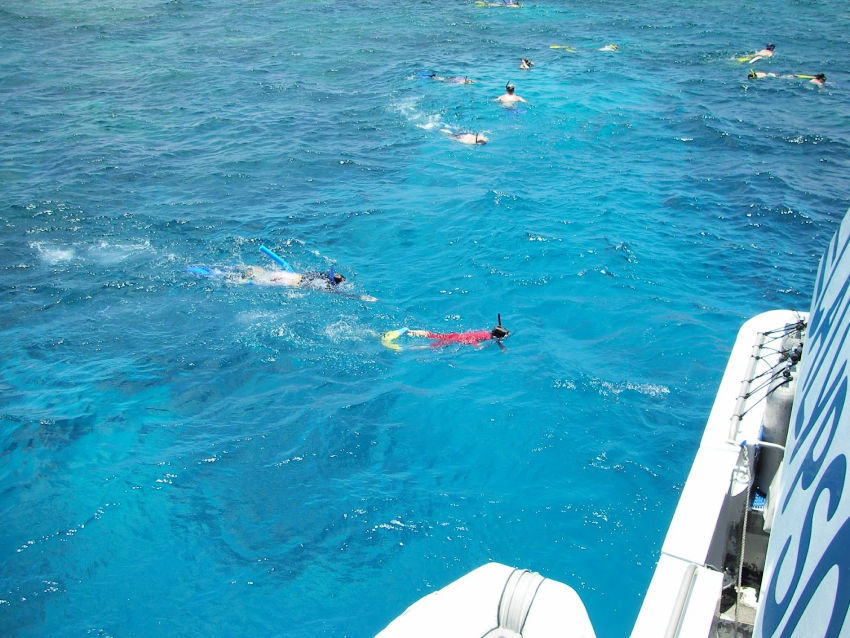
Yes, absolutely, it’s fantastic for them.
I’ve taken my kids out since they were tiny. We didn’t have much luck the first few times as they didn’t fancy the deep water but they had fun on the step of the pontoon or boat instead. The big fish can come right up close to be fed which thrills most kids. Fish feeding is generally not allowed or encouraged these days.
My husband and I have had to take it in turns with snorkeling and child watching at times, but still, take them.
My kids began to really love snorkelling on the reef around the ages of 8 and 6, neither were particularly strong swimmers, but they got about fine. Fins help children get about and flotation devices are provided ( pool noodles, sometimes life-jackets). Watching your children snorkeling on the Great Barrier Reef is priceless.
As we got into the teen and tween years the kids became snorkelling ninjas. As soon as the boat stopped they’d be gone, no fear, just fascination.
The staff on the reef boats are usually pretty fantastic with kids. The hardest part of the day is keeping them occupied and stopping them falling in (which is highly unlikely) on the journey out. Coming home they usually fall asleep after such a big day.
Will You Get Seasick?
Possibly, if you are that way inclined.
Crew normally hand out ginger-based anti-sickness tablets on departure, I don’t know if they work.
We’ve been on boats recently who had pharmaceutical non-drowsy sea sickness medication for sale.
Keep your eyes on the water and get plenty of fresh air.
I’ve only been seasick once, on the way out to the Yongala, a wreck dive off Townsville. Some people were vomiting causing fish to come up to the surface for a feed, so it was kind of gross but cool. My seasickness disappeared as soon as I jumped in the water.
What Do You Need to Take With You to The Great Barrier Reef?
Sunblock is the big one. It’s hard not to burn and even wearing a stinger suit you can burn your face. Try and find a reef- safe sunblock or sunscreen if you possibly can. Sunscreen kills coral.
The boats will generally provide plenty of food, tea, coffee, and water. Soft drinks are usually available to buy and the bar will usually open on the return trip. Obviously you need to check what the boat you choose offers.
Reef safe sunscreen is available here. Check specifications are OK for you.
The boats normally provide all gear, but again, check.
You’ll need a towel and clothes for the return trip. You can stay in your swimsuit and towel if you like but I find it more comfortable to change back into dry clothes.
Some boats have fresh water showers on board.
Should you take underwater cameras? Well we do now. We own a Go Pro. You don’t normally need a waterproof housing for snorkelling but you really do need a Go Pro handle that floats. See below. If you’re looking for a compact underwater camera to use for snorkelling and not too deep scuba, we can’t say enough good things about the Olympus Tough TG 5 . It’s an amazing piece of kit. For deeper scuba use you’ll want the underwater housing for it and maybe a wide-angle lens and colour compensator filter. Accessories just go on and on!
GoPro The Handler Floating Hand Grip (GoPro Official Mount) available here.
Should You Take a Boat or Pontoon Based Trip to The Great Barrier Reef?
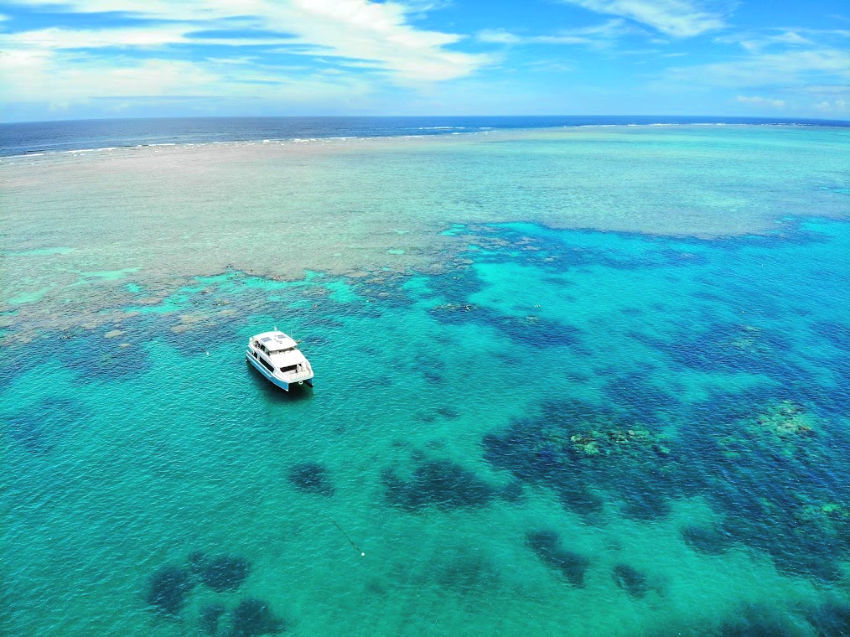
This is the big choice, some boats take you out to permanently moored pontoons, these things are huge and come with underwater viewing galleries, mini submarines, helmet diving, all sorts of frills. These may be a better option for really small children or people who know they aren’t going to snorkel.
My choice is usually the smaller reef boats, the ones that take you to the outer reef and stop at 2 or 3 snorkel sites during the day. You see a better reef. There will be fewer people in the water and you receive a more personal service.
Is Snorkeling or Scuba Diving Better?
I love scuba diving but I have kids, so we mostly snorkel.
My elder son, at 14, got his scuba certification ( See how he learned to dive in Cairns before final certification out on the reef ), my 12-year-old still preferred to snorkel, so as the kids became teenagers we juggled between the two.
When you snorkel you mostly see the top of the reef, the bit that gets the sunlight. It’s actually the prettiest part, I think.
When you scuba dive you see more of the edges and deeper parts, you can get more up close and personal with the reef and you have a better chance of seeing bottom dwellers and creatures hiding in the nooks and crannies.
You have to be qualified to dive and the course takes a few days. It can be very expensive, there is an exam, but scuba diving is worth it. Some reef boats do offer trial dives.
It will cost you an arm and a leg to learn to scuba dive on the reef up here in Port Douglas because of those long boat trips. If you can find somewhere to learn to dive from a beach, such as Magnetic Island, it’s generally cheaper. Maybe read about the time I almost died scuba diving first. But don’t let it put you off, I still dive.
Photo Credits : Not all of these were taken by the World Travel Family team, some came from the professional photographers on Calypso and Wavelength Reef Cruises, we were very kindly given them to use. You can read about these operators in the post below. Most boats will have a photographer on board to take and sell photos of your day.
So that’s about it, unless you have any questions? What do you think, would you be happy snorkeling on the Great Barrier Reef?
We have a full post on the reef boats that operate out of Port Douglas along with loads of content on Things to do in Cairns and Things to Do in Port Douglas. If you’re staying in Port our Port Douglas Accommodation Guide is here. For travel around the state, we even have Places to visit in Queensland.
Is it Snorkelling or Snorkeling?
Both versions of the verb, to snorkel, are correct. The Americans spell it snorkeling, in British English (and Australian English) it’s snorkelling. Likewise snorkelled and snorkeled. The word snorkel comes from a German word Schnorchel, an air shaft for submarines. Snorkeller gets a single l too, in the US word, snorkelers. Apologies for using both in this post, our website’s biggest audience uses the single l but mostly on this site we use UK English.
I’ve snorkeled in many countries now, the Great Barrier Reef is a big business and unlike anything I’ve seen elsewhere, it’s slick and well managed. Conservation is always a big consideration and by visiting the reef you are helping to save it. Tourism dollars send a powerful message to governments that would otherwise see it destroyed. Thanks for reading, come back soon!

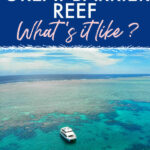


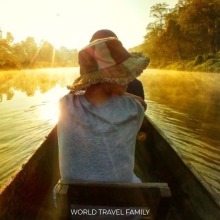
Rupert
Sunday 9th of February 2020
The Great Barrier Reef is one of the most beautiful places to snorkel and dive. Beautiful beaches and warm water makes it perfect to explore the under water World. I love Queensland and all its beauty. Can't wait to get back!
Frank
Friday 1st of November 2019
We are two couples who want to snorkel the GBR. Staying in Palm Cove. Is it best to go out of Port Douglas? I was looking at the Wavelength which seems to be a smaller boat. Seemed like a lot of people still though. How many do they pack on the bigger boats? It appeared they charge $50 per person to pick up and deliver. Would you recommend renting a car while we are in Palm Cove. It is a short visit. Flying from NZ Sunday 11/17 to Sydney and then flying up to Cairns the same day. Staying 3 nights and flying back to Sydney. Thinking of snorkeling Monday11/18 and possible rain forest Tuesday 11/19. Is it safe to wait until arriving inCairns to make our snorkel reservations? Not sure how busy they are this time of year.
Thanks in advance for your insight Frank
Alyson Long
Friday 1st of November 2019
Wavelength is a good boat. I don't think it takes a lot, under 100, but it depends how busy they are on the day, they may go out half full. Wavelength actually belongs to a friend of ours and they're passionate about conservation so it's a good choice. I'd hire a car, you have to get to Palm Cove from the airport, it would be easier with a car but cost fluctuates massively, we've hired cars from around $30 a day, but that can skyrocket at busy times. Is it safe to wait? I don't know, I've never had to book to a tight schedule because we lived there. I would certainly look at the weather forecast and pick a day with low wind. If weather is bad people could all rush to book on the one good day. The big boats, like Quicksilver are vast, hundreds of people on the pontoon and you won't see such good reefs as on Wavelength.
Anna
Monday 2nd of September 2019
You have a very interesting blog :) ! Well done!
Wonder if you can help me pls. I will be in Cairns first week of November and thought it is better to wait till a couple of days before to book an outer reef trip hoping to get the best weather conditions. The problem is the weather app I found, only predicts weather 5 days ahead. Is it usually windy there,? Most probably I''lll book personally from a tourist office, perhaps, if that is at all do-able. Not sure if this is a good idea. Or is it better to book online, say 3 days beforehand? What do you think please?
I thought it is better to have a boat that goes to 2 reefs instead of just being moored at one place, in case visibility is poor in one place! Or is it the case, that visibilty would be the same in the Cairns region reefs?
I will be taking my own prescription mask but to play it safe, considered finding a tour which provides them.
I am a strong swimmer but never swum in open ocean and must admit I'm a bit scared also of stingers and sharks. I beleve stinger suits will be provided since it will be stinger season as far as I know..
Any tips,advice and feedback would be most welcome as I am rather concerned in planning my once in a lifetime experience, ( and I am not young :) ! )
I also plan to do the Cape Tribulation, Mossman Gorge and Daintree tour.
Can you please recommend some companies?
Whilst I am looking forward to your suggestions, I thank you in advance.
Alyson Long
Monday 2nd of September 2019
I think all of the boats go to multiple dive sites, not just one ( other than the pontoon boats ) and they all have - maybe 15 different moorings and will pick the best one according to weather and tide on the day. I've only used 2 or 3 out of Cairns, we're based in Port Douglas, so I don't know for sure, but it would be odd not to move. I've only ever once had visibility so bad that it wasn't enjoyable and that was when cyclone Trevor hit us when we were out on a Liveaboard for 5 days. If it's really bad, the ships won't run. You should be fine, I've never been eaten by a croc or stung by a stinger, neither have my kids. Sharks are awesome, the ones you'll see will be small and couldn't eat anything much bigger than a goldfish. Sightings of big sharks are incredibly rare. I know some guys spotted a great hammerhead, it was the most exciting thing ever, they jumped in and swam after it. Sharks get very bad press and honestly there shouldn't be this fear. More people here are killed by horses, cows, bees, than sharks, or crocs. We usually wait on the weather and book direct with the boat company, in their office, but we can go any day that's good, no work, no school, we live here. If you only have a short window of opportunity I'd book just in case they were full. November shouldn't be too busy though. Christmas can be, and Christmas is when wind and storms seem to pick up. Fingers crossed that November will be good. There's not much current out there and it's rare to see swell or waves breaking on the reef where you're snorkelling. I took my kids out there as toddlers. There will be somebody watching out for you from the boat and if you're nervous join a guided snorkel group with a marine biologist. They're the best way to maximise what you see anyway because they know where all the cool stuff is. Find a boat that goes to the outer ribbon reefs if possible - but I think most - other than the ones that go to pontoons - do. Sorry, I don't know the Cairns boats as well as I know the Port ones.
Robin
Friday 29th of March 2019
Thanks for the awesome article! You mentioned you were going to do a price breakdown... is there a link to this? Why is it so expensive to do an all day snorkeling trip do you think?
Alyson Long
Saturday 30th of March 2019
Because of the distance, the size and cost of the boats, cost of scuba and dive gear, insurance, crew the reef tax. Imagine how much fuel these big boats use, over an hour there, another back. I haven't yet, no, sorry, tied up with our scuba coverage. Early next month maybe. Of course it's hard to do because they all change their prices constantly.
Kathleen Taylor
Monday 11th of March 2019
We will be at the GBR on May 18-20, 2019 and taking a trip out to snorkel. Should we be worried about the stinger fish/jellyfish when snorkeling? Do most tours provide suits?
Alyson Long
Monday 11th of March 2019
Every one we've been on recently has given us a free stinger suit. Years ago we had to pay for them. But I think those were very budget trips out of Cairns. Stinger Suits are mandatory in Stinger Season. You can't go in without them. People are very rarely stung on the reef, I ask every time we go out ( we've been out twice in the last month - Jan-March and will be out there for 3 days straight in March on a live=aboard) and all crew say they've never seen anyone stung out there. There are lots of little critters that may give you a tiny sting, more like a tingle, on your face as that is your only exposed part. The risk is way less out there than around the coast. Also May is coming to the end of Stinger Season. It may be over by then. They usually call it officially over in April I think.